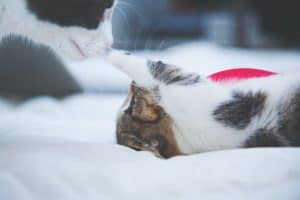Cats are beloved pets in many households, but did you know they can pose risks during human pregnancy? Let’s explore why cats can be problematic for expectant mothers.
Cats may carry a parasite called Toxoplasma gondii, which can be harmful to pregnant women and their unborn babies. It’s important to understand the potential risks associated with cats and pregnancy to ensure a safe and healthy environment for both mother and child.
Understanding Toxoplasmosis and its Risks
Ah, Toxoplasmosis – a word that sounds like a villain straight out of a superhero movie. But this isn’t fiction; it’s a real threat, especially to pregnant women and their unborn babies. So, what exactly is Toxoplasmosis? Well, it’s a parasitic infection caused by the Toxoplasma gondii parasite commonly found in cat feces.
Now, here’s the scary part – if a pregnant woman becomes infected with Toxoplasmosis, it can have devastating effects on the baby. This infection can lead to serious birth defects, such as neurological issues, vision problems, and even miscarriage or stillbirth. Yikes, right? That’s why it’s crucial for expectant mothers to take extra precautions around their feline friends during pregnancy.
Avoiding Contact with Cat Litter
When you’re expecting a little bundle of joy, the last thing you want to worry about is cat litter. But here’s the deal – cat feces can be a breeding ground for Toxoplasma gondii, putting you and your baby at risk. So, how can you handle this dirty job without putting yourself in harm’s way?
First and foremost, avoid cleaning the cat litter box if you’re pregnant. Leave this task to someone else or invest in a pair of gloves and a mask to protect yourself. Better safe than sorry, right? Additionally, ensure your furry friend’s litter box is cleaned daily to reduce the risk of contamination.
Oh, and here’s a pro tip – if you must handle cat litter, wash your hands thoroughly afterward and disinfect any surfaces that come into contact with it. These simple steps can go a long way in keeping you and your baby safe during pregnancy. Stay vigilant, mama bear!
Other Potential Risks Cats Pose During Pregnancy
Pregnancy can be a time of heightened caution, especially when it comes to our feline companions. Aside from the well-known risk of Toxoplasmosis, there are other potential dangers that pregnant women should be aware of when it comes to their cats.
One significant concern is the potential for behavioral changes in cats during pregnancy. Cats are known for being creatures of habit, and they can sometimes react negatively to changes in their environment. This could manifest as aggression, anxiety, or even avoidance behavior towards their pregnant owner. It’s important to closely monitor your cat’s behavior and seek professional advice if you notice any concerning changes.
Another risk to consider is the possibility of cat scratches. While these may seem harmless under normal circumstances, during pregnancy, they can lead to serious infections such as Cat Scratch Disease. To minimize this risk, pregnant women should avoid rough play with their cats, keep their nails trimmed, and be cautious when handling their pets.
Overall, it’s essential for pregnant women to remain vigilant and proactive in managing the potential risks that cats can pose during this delicate time. By staying informed and taking necessary precautions, both mom and cat can coexist safely and harmoniously throughout the pregnancy journey.
Tips for Keeping Cats and Pregnant Women Safe
Ensuring the safety and well-being of both cats and pregnant women is paramount during this special time. Here are some practical tips to help minimize risks associated with cats while maintaining a harmonious household:
Delegate litter box duty: Toxoplasmosis is primarily spread through contact with infected cat feces. To reduce the risk, have someone else handle cleaning the litter box or use gloves and wash hands thoroughly after.
Maintain good hygiene: Wash your hands thoroughly after handling your cat, their food, or litter box. This simple act can help prevent the spread of harmful bacteria and parasites.
Create safe spaces: Provide your cat with designated areas where they feel secure and can retreat to if they need space. This can help reduce stress and potential behavioral issues.
Regular vet check-ups: Ensure your cat is up to date on vaccinations and parasite preventatives to safeguard both their health and yours during pregnancy.
Educate yourself: Stay informed about potential risks and behaviors associated with cats during pregnancy. Knowledge is power, and understanding how to navigate these concerns can make a world of difference.
By implementing these tips and staying vigilant, pregnant women can enjoy the companionship of their furry friends while safeguarding their health and the health of their unborn child. Remember, a little extra care and attention go a long way in ensuring a safe and happy pregnancy journey for everyone involved.
Seeking Veterinary Consultation
Pregnancy can be a time of heightened caution for pet owners, especially when it comes to cats. Seeking advice from a veterinarian is crucial during this period. Your veterinarian can provide personalized guidance based on your specific situation. They may recommend simple precautions to minimize any potential risks associated with cats and pregnancy. So, don’t hesitate to reach out to your trusted vet for tailored advice to ensure a safe and smooth pregnancy with your feline companion by your side.
Common Myths About Cats and Pregnancy
Let’s debunk some common myths surrounding cats and pregnancy to ease any concerns you may have. One prevalent myth is that cats can harm babies in the womb with their presence. However, cats do not pose a direct threat to pregnant women or their unborn babies. Another myth is that cleaning the litter box puts pregnant women at risk of toxoplasmosis. While it’s essential to practice good hygiene, contracting toxoplasmosis from a cat is rare. By understanding the facts and separating them from fiction, you can enjoy a worry-free pregnancy with your cat as a loving companion.
- Myth: Cats can steal a baby’s breath while they sleep.
- Myth: Cats can sense pregnancy and become aggressive.
- Myth: Pregnant women should get rid of their cats for safety.
Remember, proper hygiene, regular vet check-ups, and common-sense precautions are key to ensuring a harmonious relationship between your cat and your pregnancy.
Fun Facts About Cats and Pregnancy
Did you know that cats can carry a parasite called Toxoplasma gondii, which can be harmful to pregnant women? This parasite is found in cat feces and can lead to serious complications for the unborn baby if contracted during pregnancy.
Another fun fact is that some pregnant women develop a condition called toxoplasmosis, which can cause flu-like symptoms or no symptoms at all. However, it can be dangerous for the baby if the mother becomes infected for the first time during pregnancy.
Creating a Safe Environment for Cats and Pregnant Women
Assign litter box duty: Since the parasite in cat feces is the primary concern, have someone else handle changing the litter box if possible. If you must do it yourself, wear gloves and wash your hands thoroughly afterward.
Regular veterinary check-ups: Ensure your cat is in good health by scheduling regular vet visits. This can help identify any issues early on and prevent potential risks to your pregnancy.
Hygiene is key: Always wash your hands after handling your cat, especially before eating. This simple practice can significantly reduce the risk of contracting any harmful bacteria or parasites.
Create a safe space: Provide your cat with a comfortable place to rest and relax away from your living areas, reducing the chances of direct contact that could pose a risk to your pregnancy.
Remember, with a few precautions and some extra care, you can enjoy a safe and healthy pregnancy while still having your beloved feline friend by your side.
Alex, a passionate animal lover, has experience in training and understanding animal behavior. As a proud pet parent to two dogs and three cats, he founded AnimalReport.net to share insights from animal experts and expand his knowledge of the animal kingdom.




